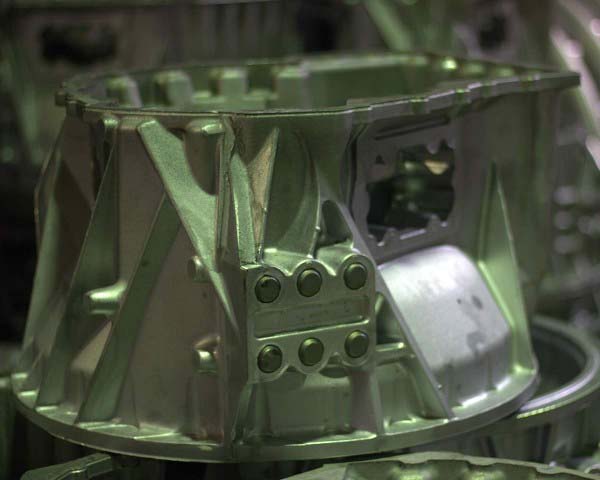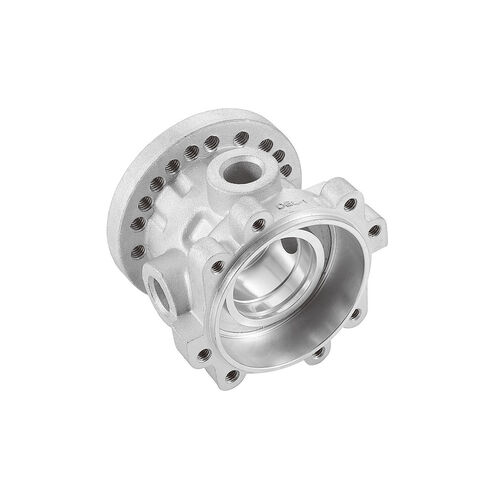Explore the benefits of industrial Precision aluminum casting for your next project
How Aluminum Spreading Adds To Reliable Manufacturing Solutions
Light weight aluminum spreading plays an essential role in modern-day manufacturing. Its light-weight nature and deterioration resistance make it a favored choice for numerous industries. Methods such as die spreading and sand casting permit the creation of elaborate components with minimal waste. The combination of automation further enhances manufacturing efficiency. The ramifications of these innovations expand past plain efficiency - aluminum casting. Recognizing the broader effect reveals substantial insights right into the future of manufacturing
The Advantages of Light Weight Aluminum in Production
Different steels are used in manufacturing, light weight aluminum stands out due to its one-of-a-kind residential or commercial properties that improve production efficiency and item efficiency. Its light-weight nature significantly decreases transportation costs and energy demands in various applications. Aluminum's outstanding rust resistance guarantees long life and resilience, lessening the demand for constant replacements and upkeep. This steel can be quickly molded and formed, permitting for flexible layout options that satisfy particular industry demands. On top of that, aluminum exhibits remarkable thermal and electric conductivity, making it a suitable option for applications needing effective warmth dissipation and electrical monitoring. The recyclability of light weight aluminum likewise plays a crucial duty in lasting manufacturing methods, as it can be reused without shedding its inherent residential properties. In general, the advantages of light weight aluminum in making bring about cost financial savings, enhanced product durability, and a lowered ecological footprint, making it a favored product in numerous markets.
Key Aluminum Casting Techniques
Light weight aluminum spreading strategies are crucial for creating top quality elements in numerous manufacturing processes. The main approaches consist of sand spreading, die spreading, and financial investment spreading. Sand spreading includes producing a mold and mildew from sand, which permits complicated shapes and huge components. This method is often preferred for its cost-effectiveness and convenience. Die spreading, on the other hand, makes use of high-pressure to inject molten aluminum right into steel mold and mildews, resulting in exact, uniform parts suitable for high-volume production. Investment casting supplies remarkable surface coating and intricate detail by making use of a wax pattern that is disappeared to form the mold and mildew. Each of these methods has particular applications and benefits, enabling manufacturers to choose the most appropriate technique based upon aspects like production volume, intricacy, and product requirements. By comprehending these vital strategies, suppliers can boost their production performance and assure the honesty of their aluminum parts.
Effect On Automotive Market
As the automotive market increasingly prioritizes lightweight materials to boost gas performance and efficiency, aluminum spreading has actually become an essential solution. This production process permits car manufacturers to create complicated components with lowered weight without compromising structural stability. By using light weight aluminum spreading, makers can produce components such as engine blocks, transmission real estates, and suspension components that are not just lighter however likewise show outstanding thermal conductivity and corrosion resistance.
The versatility of aluminum casting techniques enables the production of elaborate styles, facilitating advancement in car visual appeals and functionality. As vehicles come to be extra highly progressed, the ability to integrate features like sophisticated safety systems and electrical drivetrains ends up being important.

Aerospace Applications of Aluminum Casting
Light weight aluminum casting plays an essential duty in aerospace applications by making it possible for the manufacturing of light-weight architectural parts that enhance gas efficiency. Additionally, the precision of aluminum spreading permits the production of detailed engine parts, which are vital for peak performance and integrity. This mix of lightweight products and exact engineering settings aluminum spreading as a vital technology in the aerospace market.
Light-weight Architectural Elements
In the quest for improved efficiency and performance in aerospace applications, light-weight architectural parts have actually become significantly crucial. Aluminum spreading plays a crucial role in this undertaking, supplying suppliers with the capacity to generate parts that are both lightweight and strong. The low density of aluminum permits substantial weight reductions without endangering architectural honesty, which is vital for airplane performance and fuel effectiveness. In addition, aluminum castings can be engineered to fulfill specific layout demands, enabling the creation of complicated geometries that standard manufacturing methods may have a hard time to attain. This adaptability not only improves production processes however also adds to general expense savings. As the aerospace market proceeds to emphasize sustainability, the need for lightweight light weight aluminum parts is expected to rise, even more advancing innovation in production.
Precision Engine Components
Makers significantly count on aluminum spreading to generate accuracy engine parts for aerospace applications, driven by the product's unique homes. Light weight aluminum's lightweight nature considerably minimizes total airplane weight, boosting fuel effectiveness and efficiency. Its superb deterioration resistance assurances long life in severe settings, making it ideal for essential engine elements. In addition, light weight aluminum spreading permits tight resistances and detailed styles, vital for enhancing engine efficiency and reliability. The casting process likewise supports mass manufacturing, making it possible for manufacturers to satisfy high demand while maintaining quality criteria. As aerospace technology remains to development, the function of aluminum spreading in creating accuracy engine components will be critical in accomplishing higher performance and advancement in airplane style and functionality.
Sustainability and Ecological Advantages
The growing emphasis on sustainability in production has actually positioned aluminum casting as a leading option for eco conscious manufacturing. This procedure makes use of recycled light weight aluminum, which considerably lowers power usage contrasted to key aluminum production. By leveraging scrap metal, suppliers can lower their carbon impact and lessen waste, straightening with international sustainability goals.
Furthermore, aluminum spreading creates less hazardous emissions, adding to a cleaner environment. The light-weight nature of aluminum additionally boosts fuel efficiency in transportation applications, further promoting environmentally friendly methods.
The durability and rust resistance of aluminum lead to longer product life expectancies, decreasing the demand for constant substitutes and saving sources. As industries significantly prioritize sustainable options, aluminum casting attracts attention as a cutting-edge method that not only meets manufacturing demands however also supports ecological stewardship. This commitment to sustainability settings light weight aluminum casting as a pivotal gamer in the change towards a greener production landscape.
Cost Effectiveness in Production
Cost effectiveness is a significant benefit of light weight aluminum spreading, complementing its sustainability advantages - aluminum casting. The process of light weight aluminum casting enables the manufacturing of complicated forms with very little waste, which is particularly crucial in an affordable manufacturing atmosphere. Making use of aluminum lowers energy expenses, as it has a lower melting point compared to various other steels, bring about lowered power consumption during production
Additionally, aluminum's lightweight properties contribute to lower delivery and handling costs, even more enhancing general price performance. The toughness and rust resistance of aluminum cast items likewise imply that they need much less maintenance and substitute over time, causing lasting savings for manufacturers.
Additionally, developments in casting modern technologies, such as enhanced mold styles and automation, have streamlined production processes, lowering labor prices and increasing result effectiveness. In general, cost effectiveness in aluminum casting plays an important role in enhancing manufacturing operations and supporting affordable rates approaches.
Future Trends in Aluminum Spreading
The future of aluminum casting is significantly formed by improvements in automation and sustainable product technologies. Automation modern technologies are expected to improve performance and precision in the spreading process, while lasting methods aim to minimize ecological effect. Together, these patterns guarantee to redefine manufacturing requirements and practices within the light weight aluminum spreading industry.
Automation in Light Weight Aluminum Spreading
Embracing automation is changing aluminum spreading procedures, leading the way for enhanced performance and accuracy. Automated systems simplify production by decreasing human treatment, lowering errors, and raising throughput. Technologies such as robotic arms and computer system numerical control (CNC) equipments enable accurate and constant shaping of aluminum elements. In addition, clever sensing units keep track of different parameters in real time, making sure excellent problems throughout the spreading process. This combination of automation not only shortens preparations but additionally improves product quality by preserving tighter tolerances. As producers increasingly embrace these advanced modern technologies, the aluminum casting industry is readied to experience substantial enhancements in functional performance, cost-effectiveness, and competitiveness in the global market.
Lasting Product Innovations

Regularly Asked Concerns
What Kinds Of Aluminum Alloys Are Generally Made Use Of in Spreading?
Generally utilized light weight aluminum alloys in casting include 356, 380, and 413. These alloys are favored for their excellent fluidness, strength, and corrosion resistance, making them ideal for a variety of commercial applications.
Exactly How Does Aluminum Casting Contrast to Other Steel Casting Methods?
Aluminum casting usually uses lower weight, remarkable rust resistance, and far better thermal conductivity compared to other steel casting methods. In addition, it permits intricate styles and faster production cycles, boosting overall manufacturing efficiency and efficiency.
What Industries Benefit Many From Light Weight Aluminum Spreading?
The vehicle, aerospace, and electronic devices industries benefit most from aluminum spreading. These industries use its light-weight, corrosion-resistant residential or commercial properties to boost performance, minimize fuel usage, and improve overall product efficiency, making aluminum casting increasingly essential.
Are There Particular Style Limitations With Aluminum Spreading?
Yes, aluminum casting has design constraints, consisting of restrictions on wall surface thickness, complicated geometry challenges, and possible problems with attaining tight tolerances (Aluminum Casting Company). These variables can affect the overall strength and functionality of the final product
Just How Is High Quality Control Maintained in Light Weight Aluminum Spreading Processes?
Quality control in light weight aluminum spreading procedures is preserved with rigorous assessments, adherence to standard procedures, and the use of sophisticated innovations. Normal surveillance warranties dimensional accuracy, surface area stability, and material uniformity throughout manufacturing, advertising overall integrity.
As the vehicle market increasingly prioritizes lightweight materials to boost more info gas performance and performance, aluminum casting has arised as an important solution. Aluminum spreading plays a vital duty in aerospace applications by making it possible for the production of light-weight architectural components that improve fuel performance. Cost performance is a significant benefit of aluminum spreading, enhancing its sustainability advantages. Embracing automation is changing light weight aluminum casting processes, leading the method for improved efficiency and precision. Recycled aluminum usage has actually obtained traction, substantially decreasing energy usage contrasted to primary light weight aluminum manufacturing.